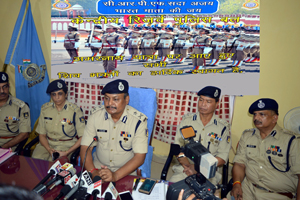Excelsior Correspondent
JAMMU, Aug 7: A heightened level of alertness and a strong multi-tier security set up prevented terrorists from disrupting the annual 40-day Amarnath yatra in the Jammu region, a senior CRPF official said today.
While the yatra ended peacefully in Jammu, a terror attack on a bus on July 11 in Anantnag district of Kashmir left eight devotees dead and several others injured.
Click here to watch video
“Barring the July 16 road accident near Banihal which claimed the lives of 17 pilgrims and left 26 injured, the yatra ended peacefully here and it is because of coordinated efforts by all security agencies,” Inspector General of the CRPF (Jammu sector) Abhay Vir Chauhan told reporters here.
He said there were intelligence reports about a possibility of terror attacks but the terrorists could not succeed due to the alertness of the Army, CRPF, police and other agencies.
“No such thing (terror attack) was witnessed in the Jammu region, but we were fully prepared to deal with any situation,” the CRPF officer said.
He said the Government reposed faith in the force and gave it the added responsibility of securing the entire route from the Bhagwati Nagar base camp here to the base camps in Kashmir.
More troops were deployed and gadgets were used this year as against previous years in view of the intelligence inputs “suggesting a determined attempt by terrorists to target the yatra”, Chauhan said.
The pilgrimage began from here on June 28, a day ahead of its commencement from the twin routes of Pahalgam in Anantnag district and Baltal in Ganderbal district.
A total of 2.60 lakh pilgrims performed the yatra, which ended today. The pilgrimage concludes on the festival of Raksha Bandhan every year.
He said adequate steps were taken for the peaceful conduct of the pilgrimage “but there’s still a place for improvement”.
Timely departure of devotees from the Bhagwati Nagar camp will help them reach their destination in time before dusk, he said.
“Ensuring timely departure of convoys was a major challenge. Traffic snarls were another cause for concern. If the pilgrims could leave the camp early, we could avoid traffic congestion on the highway,” the CRPF IG said.
“At times, convoys reached the base camps in Kashmir after dusk, which is not good from the security point of view,” he said, adding the delay was due to unavoidable circumstances.
He said the Bhagwati Nagar base camp, which was his area of responsibility, was fully fortified.
“The CRPF, for the first time, used unmanned aerial vehicles to keep a close watch on everything. Where naked eyes could not see, we deployed UAVs,” Chauhan said.
While CRPF and police personnel were deployed on road opening duties on the highway, the Army secured the hills overlooking the arterial roads.
“Landslides is not in our control but we were prepared to deal with such a situation to ensure normal traffic movement on the highway.
“The personnel, who were to be deployed in landslide- prone areas, were given a special one-week training at Nagrota,” the CRPF officer said. The force also set up a booth at the railway station for helping pilgrims out.


